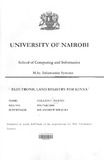Resource information
Land in most Kenyan societies is the most important of the natural resources, representing
the foundation of much of the country's economic activity. For most individual Kenyans,
the purchase of a parcel of land represents the largest financial and legal transaction of their
lifetime. Hence the buying, selling, and refinancing of land is a significant component of the
Kenyan economy. Therefore the. ability to firmly and quickly establish ownership and to
allow secure and effective transfers is essential to the economic competitiveness of Kenya in
the modern world. The ever-increasing growth in population has led to the ownership of
land changing hands frequently. This has led to an increase in the number of transactions
carried out daily in the land registries, and corroborated with the independent decentralized
land registries units, makes the present manual registration system slow, cumbersome, costly
to run, manage and maintain.
The idea was conceptualized after a study of land registration in England, Wales and the
province of Ontario, who have successfully managed to fully implement Electronic Land
Registration. From this study, ways in which Kenyan land registration system could be
improved.
The current land law recognizes paper based transactions only. For Electronic registration
system to be actualized, reference was made to the land laws of Kenya, consultation with
land law experts was also done so as to formulate a suitable legal framework. Electronic
land registration system for Kenya, has been designed with the end user in mind, the system
supports the current workflow of documents from one office to the next in a typical land
registry. The language used on the interface is simplified and the system generated messages
uses jargon that the end users are used to. This makes it easier for them to adapt to the new
system and also reduces training time.


